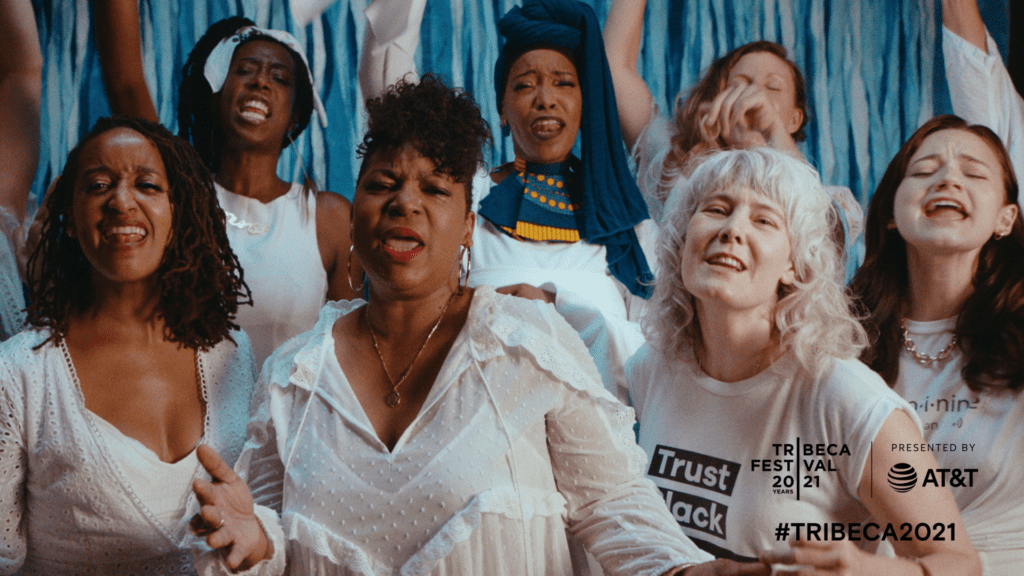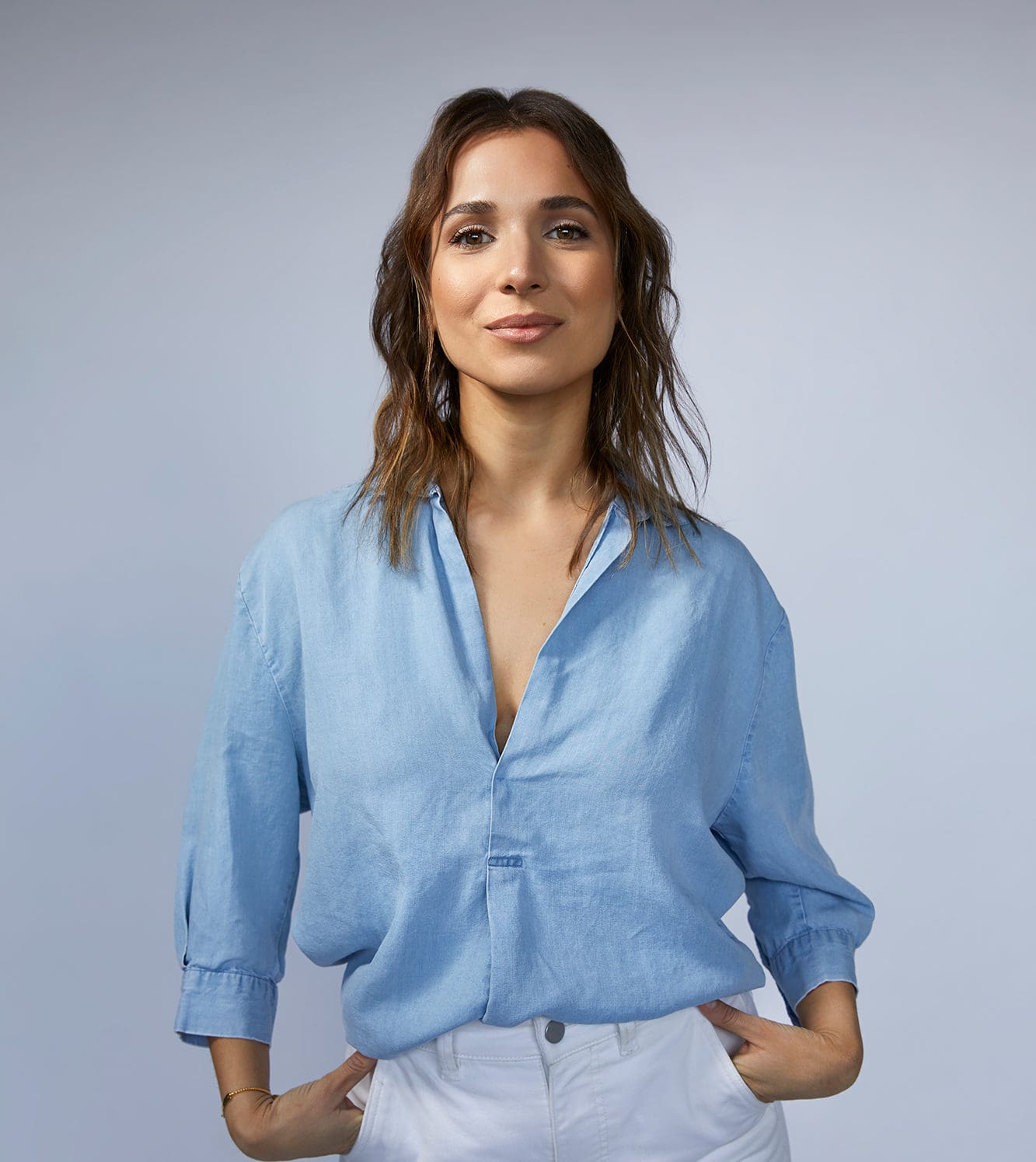To say we were star struck when given the chance to interview Dasha Kova is an understatement. This incredibly talented film maker, whose work has premiered at The Grammys and New York Fashion Week and been honoured with official selections at Tribeca Film Festival and respective Academy Award qualifying festivals, considers herself a global producer of content that empowers people to make change. She celebrates captivating-creative, while supporting equitable spaces. Now, her documentary short film, RESIST, is making the 2021-22 festival-circuit rounds. When she’s not producing digital media, she’s in her kitchen baking up tasty and, um, “healthy,” baked goods. Check out our Q&A below to learn more! —Vita Daily

You started Kova Media Ltd. after years in the production and media industries. It must be a tough industry for self-employment, why did you decide to go it on your own?
When I started out in the media and production industry, I was excited to take everything on because I had so much I wanted to learn—it was all new. I managed a full time job while pursuing freelance opportunities and passion projects on the side. While I appreciated that my full-time jobs afforded me the consistency of production work I was still limited to the scope of work companies attained and I found myself still in pursuit of more creativity—I wanted to make beautiful and educational content. I was also exploring what my specific creative voice was which is why I would start my own projects, or collaborate with people who inspired me and bring their ideas to life. Eventually, I realized I was more inclined to pursue independent jobs and manage my projects than stay in a salary-job that didn’t afford me the same freedom. I left my full time position at the start of the pandemic and spent the first two months slowing down for the first time in years and meditating on my next steps. I then reached out to creative agencies, production companies and brands, while continuing to make my short film RESIST: The Resistance Revival Chorus. By June 2020 I incorporated Kova Media Ltd. and the networking conversations I’d had in the months prior fortunately led to my first contracts—I was brought on to produce for TV commercials, an international web series, a virtual music festival; the diversity of my work portfolio continues to grow in a way that is incredibly exciting and fulfilling for me.
For all the would-be production entrepreneurs out there, especially women, any regrets over the move?
Absolutely none. I have discovered that I operate best self-directed, jumping around different types of productions, while discovering new clients and collaborators. I continue to be inspired by entrepreneurial women and I love to see women take exciting risks that propel their careers. I listen to podcasts (Second Life is a great one) that highlight career jumps—at any age—and an individual’s ongoing list of accomplishments. The move for me to be independent in my career was unknown and nerve-racking at first, but has ultimately led to considerable autonomy and greater opportunity.
Let’s talk about Resist. By the way, congratulations for the Tribeca nod; can you just tell us what Resist is all about?
RESIST: The Resistance Revival Chorus captures the efforts of a diverse group of women and non-binary individuals’ mission to confront fear, oppression, and prejudice with the bonding call of poet Toi Derricotte’s words, “Joy is an act of resistance.” Singing inspirational protest anthems written throughout the history of America, the chorus takes their music to New York City’s streets and provides fellow resisters a collective soundtrack to motivate activism. With the rise of such civil rights and civic movements as Black Lives Matter, Close the Camps, Me Too, Stop the Bans and the Global Climate Strike, the chorus finds that their fervent efforts begin to influence local and national change, igniting a larger movement. In Atlanta, San Diego, Riverside, California and other towns and cities across the country, new chapters rise with the same fuelled passion to support justice and equal rights for all people. Together, with the harmony of their voices uplifted in song, a universal language of justice and joy engages the world. The RRC originally began as a self-restorative measure for its members (each from different economic and artistic backgrounds, ethnicities, and ages) who were left feeling discouraged after the 2016 Elections. Through the Women’s March movement, sharing stories, and singing songs of protest stemming from the civil rights, labor rights, and women’s rights movements the chorus grew to become over 70 members in NYC. With the chorus’s activism taking not just the streets, but the stages of the Grammys, Carnegie Hall, and the Apollo, the message of the chorus amplified and soon other cities became inspired by its movement. In Atlanta, San Diego, and Riverside, CA, each chapter leads with the same mission statement of joy, inclusion and progress as they impact their respective communities with their fight of song.
The film’s description positions it in “a divided country.” What does this mean to you?
This project is very close to my heart because I think that political, religious, societal divisions or tensions are experienced in every country. This is a universal issue but it is especially true of the U.S. political climate now. The divide ultimately comes down to opposing points of view which is where we see a resistance to change, a lack of acceptance, inequality, a lack of unification in communities, belligerent hate and oppression.
How much of an affinity do you feel with other organizations and/or creative projects to wrestle with the division? Which ones?
There are so many organizations doing important work in a range of issues from women’s reproductive rights, protecting voting rights, racial and criminal justice reforms, education reforms, to climate control. The Resistance Revival Chorus is one that originally stood out to me because they lead with joy and connection to help raise awareness across more than one cause. Many of the members support different organizations and share resources to highlight those missions. They also put out a tool kit online to incentivize other cities to start their own Chorus. It can all feel overwhelming when there is an abundance of movements that need active support, but beginning to follow and get involved with organizations that are helping unify communities through education and calls-to-action is a good way to start.
Resist was a collaboration between you and two fellow producers. Give us the raw goods on the ups and downs of collaboration.
UPS: Learning from each other—each individual brings unique skills and expertise to the project. It has also been powerful to work with a team of women that inspire me, keep me motivated, and ultimately care about what we’re building together. We share a lot of love for each other after two years making the film and now experiencing the film festival circuit. DOWNS: Scheduling! Trying to get three very busy working production ladies onto a weekly call has been a challenge over the last few years. We do have an active text thread where we communicate all-day-every-day. You won’t always see eye-to-eye and in those moments it could be stressful working as a team. It’s important to remember that in any collaboration you will likely need to go back to revise your ideas or documents, and in our case review the video edit more than 10 times until you are (for the most part) aligned.
Let’s move to your commercial work. You’ve that you want your work to “celebrate captive creative,” and support equitable spaces. It’s easy enough to see how your documentary work may facilitate these, but what about your work with corporate brands? How do you migrate such priorities from one side of your work to the other?
I believe that an equitable space is built up by who you hire, how you hire, and how you manage. I am naturally drawn to companies and environments that are more inclusive and promote equity starting from their management and company ethos, to the work that they put out in the world. I am also very fortunate to be surrounded by talented, creative, intelligent and diverse individuals who I always aim to put forward on paid projects. I mention pay because I think paying for people’s time is also a part of an ethical work environment—don’t ask for free labour. Prior to working on my documentary, I didn’t see all brands necessarily approaching the need for equity outright. With many powerful movements coming into focus in recent years—#MeToo, BLM, Stop Asian Hate, just to name a few—I have definitely seen a shift in the growing consciousness of brands now. However, the work doesn’t stop here, it’s important that inclusivity exists at every level: on set, in company culture and society at large. Having my own company now, where I get to select my clients and someday hire on employees, I have the privilege and opportunity to mandate and promote inclusivity beyond just productions.
For those just out of school, female and passionate about working in creative media, tell us two things you dearly wish you’d been told.
Bet on yourself. Don’t be afraid to create the work you want to exist in the world. Keep going and choose all the work you want to do; even if all the odd jobs and career paths don’t seem to line up right now … trust that eventually they will make sense.
What’s next, creatively, for Dasha Kova?
While RESIST continues it’s festival run after our Tribeca Premiere, I’m slowly seeing the space open for a new passion project. I’ve long wanted to step into the arena of feature films and have a deep passion for health and wellness. I’m not quite sure how everything will line up, but following my own advice above, I’m continuing to bet on myself and trusting that when the opportunities arise, I’ll be there to take them on.

Be the first to comment